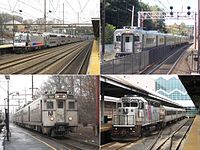Sunnyside Yard
40°44′59″N 73°55′37.37″W / 40.74972°N 73.9270472°W




Sunnyside Yard is a large coach yard, a railroad yard for passenger cars in the Sunnyside neighborhood of Queens in New York City. The yard is owned by Amtrak and is also used by New Jersey Transit. The Pennsylvania Railroad (PRR) completed construction of the yard in 1910; it was originally the largest coach yard in the world, occupying 192 acres (0.78 km2).
Harold Interlocking, the United States' busiest rail junction, is part of the yard. The shared tracks of the Long Island Rail Road (LIRR) Main Line and Amtrak's Northeast Corridor pass along the southern edge of the yard. Northeast of the yard a balloon track (or reverse loop) is used for "U-turning" Amtrak and NJ Transit trains which terminate at Penn Station. Leading eastward near the south side of the yard, this balloon track switches off and turns left under the LIRR/Amtrak tracks, turns left once again, and merges with the Sunnyside yard track to turn the train west toward Penn Station.
History
[edit]The Pennsylvania Railroad (PRR) completed construction of the yard in 1910.[1]: 93 At that time, Sunnyside was the largest coach yard in the world, occupying 192 acres (0.78 km2) and containing 25.7 miles (41.4 km) of track.[1]: 76 The yard served as the main train storage and service point for PRR trains serving New York City. It is connected to Pennsylvania Station in Midtown Manhattan by the East River Tunnels. The Sunnyside North Yard initially had 45 tracks with a capacity of 526 cars. The South Yard had 45 tracks with a 552 car capacity.[1]: 93
Factories surrounded Sunnyside Yard. On the south side the Degnon Terminal rose, with businesses served by the railroad. It included the American Chicle company factory for chewing gum, the Eveready Battery Company factory for batteries, and the Loose-Wiles Sunshine Biscuits factory.[2] The Swingline Stapler factory was immediately east of there, at 32-01 Queens Boulevard.
Plans
[edit]East Side Access project
[edit]As part of the East Side Access project to the new LIRR terminal at Grand Central Terminal (opened January 25, 2023), some LIRR trains diverge from the main line and travel through a tunnel under the yard. The project would also create a new station at Queens Boulevard, named Sunnyside.
Harold Interlocking
[edit]In May 2011, a $294.7 million federal grant was awarded to address congestion at Harold Interlocking, the United States' busiest rail junction, which is part of the yard. The work will allow for dedicated tracks to the Hell Gate Line right of way for Amtrak trains arriving from or bound for New England, thus avoiding NJT and LIRR traffic.[3][4] Some of the interlocking improvement projects are complete as of early 2023. Other projects are ongoing and will be complete by late 2025.[5]
Housing development
[edit]In 2017 it was announced that the city would begin a feasibility study into the construction of 21,000 to 31,000 units of housing on top of the rail yard. The project, which would be similar to the Hudson Yards development over West Side Yard, has stoked public controversy over the affordability of units, pedestrian and road connections, open space, and a nearby Superfund site.[6][7] In September 2019, a public meeting was interrupted by protestors chanting, "We Don't Trust this Process!"[8] In early 2020, Amtrak and the city government published a master plan. The plan called for building a deck over Sunnyside Yard and constructing 12,000 housing units, all of which would be affordable housing, as well as 60 acres (24 ha) of parks and public plazas.[9][10]
See also
[edit]- List of railroad yards in New York City
- New York Connecting Railroad
- New York Tunnel Extension
- Transportation in New York City
References
[edit]- ^ a b c Couper, William, ed. (1912). History of the Engineering, Construction and Equipment of the Pennsylvania Railroad Company's New York Terminal and Approaches. New York: Isaac H. Blanchard Co. Retrieved September 24, 2009.
- ^ "The Degnon Terminal Industrial Area". Queens Public Library Digital Archives. Retrieved July 15, 2023.
- ^ "Maloney Hails Federal Grant to Ease Amtrak Delays in NYC, Spur High-Speed Rail in NE Corridor - $294.7 Million Grant to Improve "Harold Interlocking", a Delay-Plagued Junction For Trains in the NE Corridor". Congresswoman Carolyn T. Maloney. May 9, 2011. Archived from the original on September 28, 2011. Retrieved May 13, 2011.
- ^ Colvin, Jill (May 9, 2011). "New York Awarded $350 Million for High-Speed Rail Projects". DNAinfo.com. Archived from the original on May 13, 2011. Retrieved May 13, 2011.
- ^ Milestone Report; Network Expansion—Regional Investments (Report). New York: Metropolitan Transportation Authority (MTA). Retrieved February 8, 2023.
- ^ Ludovici, Derek (June 5, 2019). "The Dark Side of Sunnyside Yards". The Indypendent. Retrieved July 22, 2019.
- ^ Stapinski, Helene (August 16, 2018). "Is a Rail Yard in Queens the Site of New York's Next Mega-Development?". The New York Times. ISSN 0362-4331. Retrieved March 7, 2020.
- ^ Shapiro, Gideon Fink (February 1, 2020). "Sunnyside Up". New York Review of Architecture. Retrieved January 19, 2023.
- ^ Parry, Bill (March 3, 2020). "City releases long-term Sunnyside Yard Master Plan promising new public transit and 100 percent affordable housing". www.amny.com. Retrieved March 7, 2020.
- ^ Brenzel, Kathryn (March 3, 2020). "Economic Development Corp Unveils Sunnyside Yard Master Plan". The Real Deal New York. Retrieved March 7, 2020.

